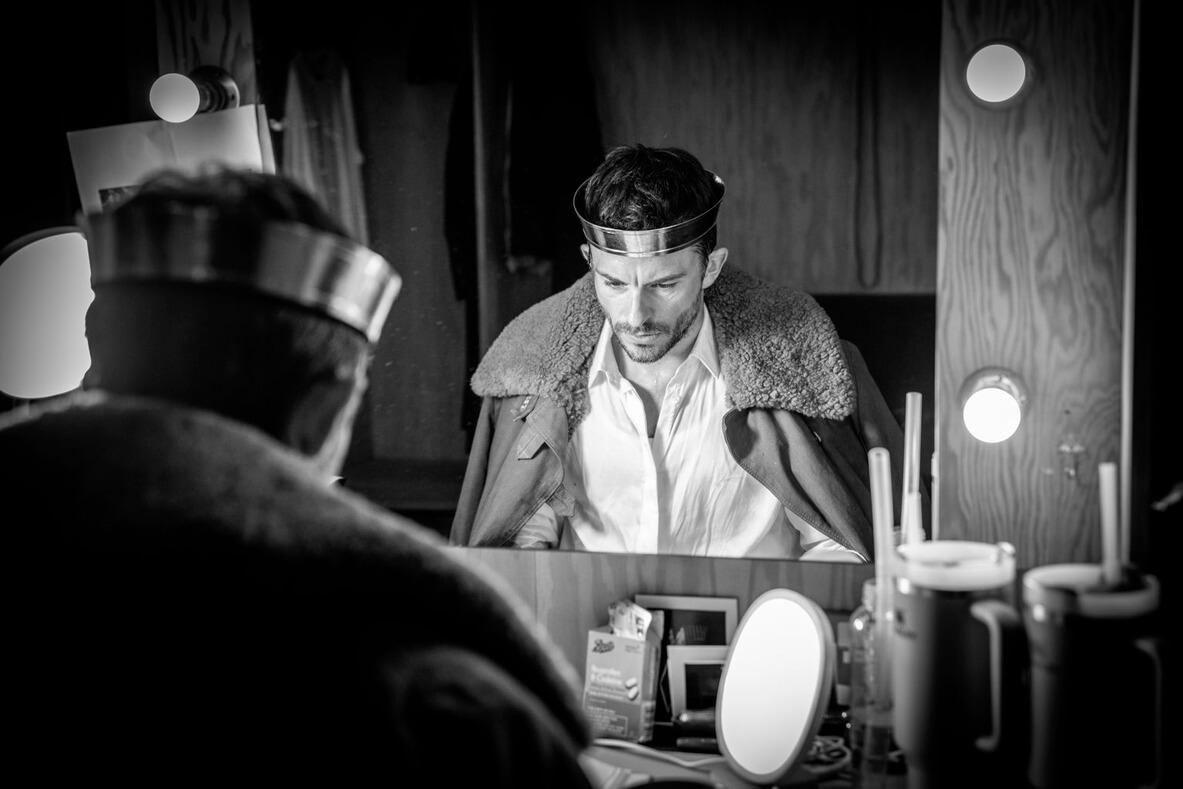A father dies, leaving his children and their partners to clear the years of clutter and to separate items of value from those which can be discarded. Whilst audience members take their seats and for the first few minutes of the play, much of the thrust stage is divested of a lifetime’s accumulated bric-a-brac by the players, who are about to explain their situation to the audience but instead descend into an histrionic argument between Nicola and her brother Philipp (Dorothea Myer-Bennett and John Heffernan). They lambast and deliberately antagonise one another about who did (and did not) stay to look after father during his bout of failing health, and there’s something bizarrely manic and juicy about this initial salvo of exchanges. The cast, directed by Patrick Marber, manage to land every irksome and instantly recognisable sibling irritation with nuance, glibness and hilarity.
As matters progress, a discussion ensues around the origin of a brown paper wrapped watercolour stashed in the attic and whether or not it possesses any aesthetic merit. The debate has a detached quality and merely offers further opportunities for point scoring, until the painting is removed from its frame whereupon a signature which had previously been hidden, is revealed in the border. A Hiller maybe, or is it A Hitler? Is the tick merely a blemish or an intentioned crossbar on the letter “t”? Once again a raging and ill-tempered debate ensues — this time including Nicola’s husband Fabian (Gunnar Cauthery) and Philip’s wife Judith (Jenna Augen) which before long, nosedives into revealing previously suppressed opinions around Judith’s Jewishness, Israel’s geo-political behaviour, the Palestinian situation and what it means to be a modern German in a country which treads a fine line between displaying contrition for past wrongs whilst leading international conversations on difficult and inflammatory topics. At this point matters undertake an interesting theoretical twist by delving into whether a work’s artistic merit (and potential sale value) are inextricably linked to its creator. As Judith contentiously infers, irrespective of the painting’s merits, if the person who created it was subsequently discredited and vilified due to their destructive impact on mankind, shouldn’t the piece be deemed valueless and simply destroyed for fear it depicts his humanity? In an age of cancel culture, the point has very considerable ramifications.
Thankfully, the playwright’s research means that the heated exchanges maintain a jaunty and even zany pace at times and reveal many rarely-considered obvious contradictions, like Hitler’s long-standing arrangement with the Jewish family business he used for framing his paintings and how key prominent Jews e.g. Karl Marx were some of the most vocal critics of German Jews’ pursuit of capitalism whilst simultaneously pressing for emancipation, (when as he put it, they should have been as vehement in pressing for Germany’s emancipation as a whole).
As the conversation about who owns the painting, who wants the painting, who wants the painting destroyed, and the all important question about how much it might be worth continues, the final characters enter the fray. Jane Horrocks’ delayed appearance as Dr Evamaria Günther adds a cooling dimension to the bickering as she delivers a steely, detached, expert art historian’s evaluation of Hitler’s fanatically detailed watercolour, which she deems an unmistakable and frequently repeated subject of a church and its grounds. Later, we meet the flamboyant, uber-rich, art-collector Kahl (Angus Wright), who enjoys one of the bizarrest initial ‘entrance and exit’ of any character in recent theatre memory. Between them, they delve into the need for attribution and provenance, exposing the human failing of believing what we want to believe, often despite all evidence to the contrary. As the painting’s potential value steadily increases, the human cost escalates to a point where individual family members take matters into their own hands to secure their preferred end result.

 John Heffernan & Jenna Augen in Nachtland at Young Vic © Ellie Kurtt
John Heffernan & Jenna Augen in Nachtland at Young Vic © Ellie Kurtt

